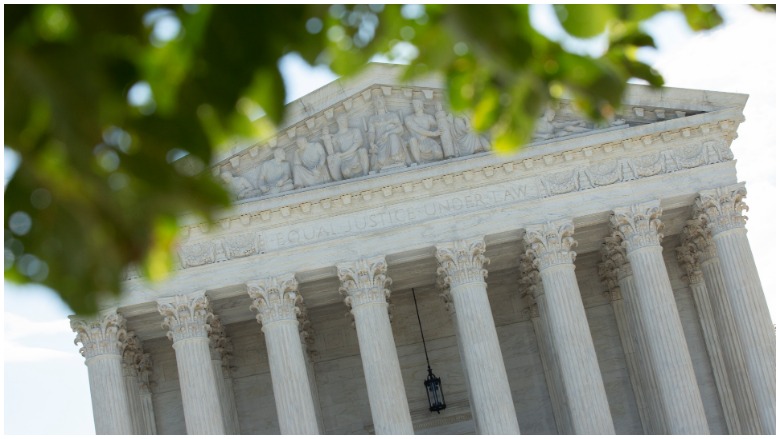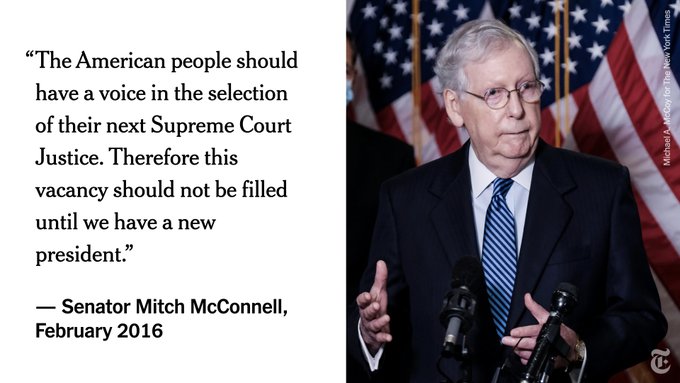
Getty The outside of the Supreme Court building.
Democrats, in anticipation of another Supreme Court fight to prevent Trump from filling the seat left vacant after Ruth Bader Ginsburg’s death, have introduced a bill limiting Supreme Court justices to limits of 18 years instead of the current lifetime appointments they hold now.
The bill, called the Supreme Court Term Limits and Regular Appointments Act, would exempt current justices. It is proposed at a time when Republicans will begin the confirmation process of Trump’s most recently nominated judge. After hinting that he had already decided on his pick, Trump announced on Saturday, September 26, that his next Supreme Court pick will be conservative Judge Amy Coney Barrett.
Presidents Would Be Able to Appoint Two Supreme Court Justices Every Four Years
The Democrats’ bill to change how long Supreme Court justices serves would also dramatically change when and how often they are appointed; the bill language stating that every president would have the opportunity to appoint two justices:
The President shall, during the first and third years after a year in which there is a Presidential election, nominate, and by and with the advice and consent of the Senate, appoint one Justice of the Supreme Court. EFFECTIVE DATE.—A Justice appointed pursuant to subsection (a) shall be sworn into office on August of the year on which the appointment is made.
The most senior justices on the court would have limited duties if new appointments would expand the court beyond nine justices. New justices appointed after the bill went into effect would become “senior” justices after 18 years and would be rotated to lower courts. The bill states:
Any Chief Justice of the United States or Associate Justice of the Supreme Court who has retired from regular active service under section 371(b) of this title shall be known and designated as a Senior Justice and may continue to perform such judicial duties as such Justice is willing and able to undertake, when designated and assigned by the Chief Justice of the United States.
The bill was put together by Reps. Ro Khanna of California, Joe Kennedy III of Massachusetts and Don Beyer of Virginia. Here’s what Khanna said about the bill, according to Reuters:
It would save the country a lot of agony and help lower the temperature over fights for the court that go to the fault lines of cultural issues and is one of the primary things tearing at our social fabric. (The rotation system is) perfectly consistent with their judicial independence and having a lifetime salary and a lifetime appointment.
The bill also includes contingencies of what should happen in the case of an unexpected death of one of the justices. You can read the draft of the entire bill here. Democrats are expected to introduce the bill next week, according to Reuters.
The Bill Could Face Constitutional Hang-Ups
It is unlikely that the Democrats’ proposed bill would make it through the Republican Senate before they finish attempting to appoint Barrett. However, the bill could be enacted if Democrats win control of the U.S. Senate on down-ballot races during the 2020 presidential election or if it gains bipartisan support after Barrett’s appointment.
Some legal scholars have questioned whether this can be achieved through Congressional action and have said any changes to how long Supreme Court justices, as well as federal judges, serve would require changing the U.S. Constitution.
Article III of the U.S. Constitution currently says, “The judges, both of the supreme and inferior courts, shall hold their offices during good behaviour, and shall, at stated times, receive for their services, a compensation, which shall not be diminished during their continuance in office.” The Supreme Court has interpreted this to mean, “that the Justices hold office as long as they choose and can only be removed from office by impeachment.”
Proposed Bill Follows Republicans’ Rush to Fill Seat Vacated After Ginsburg’s Death
The proposed bill comes in the context of Republicans’ promise to fill the Supreme Court seat less than two months out from the 2020 presidential election after refusing to even hold hearings for President Barack Obama’s pick of Merrick Garland during his last term in office on the grounds that the new president should choose the next Supreme Court justice.
In his statement on Ginsburg’s death, Senate Majority Leader Mitch McConnell announced that he would unequivocally hold a vote to fill the vacant Supreme Court seat.
In response, Schumer tweeted that the next president should fill the vacancy. On a phone call with other Democratic members of Congress, Axios reported that Schumer also said if McConnell attempts to fill the vacant seat, “Nothing is off the table next year.”
New York Congressman Jerry Nadler tweeted that Democrats should expand the court if they win the majority in the next election, writing, “If Sen. McConnell and @SenateGOP were to force through a nominee during the lame duck session—before a new Senate and President can take office—then the incoming Senate should immediately move to expand the Supreme Court.”
READ NEXT: Stimulus Checks 2: Where Mnuchin & Pelosi Stand With Talks Restarted
